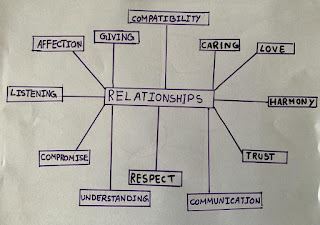Jugjiv and Sandeep introduced a new book, "My Name is Cinnamon," by Vikas Prakash Joshi. The book tells the story of a young boy's quest to find his biological parents. Jugjiv shared the author's background, highlighting his successful writing career and numerous awards.
Discussing 'The Word From the Author' by Vikas Joshi
Jugjiv led a discussion about the book "The Word from the Author" by Vikas Joshi, with Manisha reading the "Word from the Author" section. The group also included RP Sir, the chairman of Learning Forward India, Sandeep, the founder, and Manisha, the Principal. Jugjiv structured the discussion to alternate between reading the book, asking questions, and reading again. Vikas shared his writing journey, stating that writing was part of his identity, not a compulsion or ambition. The group also learned about Vikas's challenges in publishing his book.
Book Reading and Character Introduction
Jugjiv introduced the book's theme, emphasising the author's intent to reflect the reader's experience and offer a glimpse into other worlds. Vikas Prakash then began reading from the book, starting with the introduction and continuing into chapter one. The reading focused on the main character, Cinnamon, and his experiences as a goalkeeper in a school football championship. The narrative was filled with details that evoked a sense of excitement and tension, culminating in Cinnamon's crucial penalty kick.
Cinnamon's Story: Adopted Child's Achievements and Dreams
Vikas Prakash narrated a story about Cinnamon, an adopted child who loved sports and cinema. Cinnamon's parents, Ma and Baba, were proud of their son's achievements, and they celebrated his success as if he were their biological child. The story also touched on Cinnamon's dream of becoming an Indian football player and winning the World Cup. The chapter ended with Cinnamon receiving a giant fruit instead of a chocolate bar to reward his performance.
Vikas Prakash's Book Reading and Writing Inspiration
Vikas Prakash read the first chapter of his book, "Cinnamon," in front of an audience that included students and teachers. Rajinder, a schoolteacher, praised Vikas' writing and encouraged students to start writing at a young age, citing famous writers who began writing in school. Vikas explained that "Cinnamon" was inspired by his childhood love for reading and his teacher's insistence on correct pronunciation. He also shared that his own life experiences heavily influenced the plot of his book and that the advice of a more experienced writer led him to write about his unique experiences in his first book. Yashraj and Jugjiv listened to his story and reflected on their own experiences, and Vikas emphasised that his book fills a gap in the market for children's books in India.
The Boy Who Grew Up" Book Discussion
Vikas Prakash introduced his new children's book, "The Boy Who Grew Up", which explores themes of adoption, identity, and self-discovery through a humorous and engaging story. He intended to impart positive values to children while tackling serious topics. When asked about the key messages he wanted children to take away from the book, Vikas emphasised the importance of not making assumptions based on initial behaviour and not limiting oneself based on past experiences or mindsets. He also revealed his writing approach, which involves starting with a general idea and allowing the story to unfold as he writes, discovering new elements.
Creating Characters and Overcoming Rejection
Vikas Prakash discussed the process of creating characters for his book, emphasising the importance of making them realistic and relatable. He also shared his experience of rejection from publishers, which he described as a standard and expected part of the writing process. Shubhangi asked about the title of his book, which was initially rejected by publishers but is now being translated into six languages. Manisha asked about the most challenging chapters to write, and Vikas identified two chapters at the end of the book as particularly difficult.
Vikas Prakash's Child Adoption Journey and Writing Process Vikas Prakash shared the emotional challenges he faced while writing about a child's adoption journey, highlighting the complex relationships involved. He revealed that his motivation for writing the book was a childhood dream and a desire to share the story inside him despite the pandemic's challenges. The initial draft took a few months, but reworking and making changes based on publisher feedback took around 6-9 months, totalling 1-1.5 years. The team expressed their gratitude towards Vikas Prakash for his time and insights, and RP emphasised the importance of broadening one's perspective through travel and meeting people from different backgrounds.
Challenges in Urban Tree Growth and Care
The discussion centred around the challenges trees face, particularly those planted in urban environments. The speaker highlighted how trees in parks, often not native to the area, struggle to grow in urbanisation's harsh conditions, including compacted soil, lack of open space, and constant human interference. The speaker also noted how the mechanical process of planting and maintaining trees, such as pruning roots, can negatively impact their growth and health. The discussion underscored the need for a more nurturing and supportive approach to tree care and maintenance.
Urban Tree Growth and Maintenance
The speaker discussed the growth and maintenance of trees, using redwoods as an example. They highlighted the contrast between the natural development of old-growth forests and the managed growth of urban trees. The speaker noted that urban trees often suffer from over-pruning, leading to fungal infections and stunted growth. They also pointed out that the compacted soil and restricted growth on the roadside make it challenging for urban trees to thrive. The speaker emphasised the need for a more natural approach to tree care to allow them to grow and develop properly.
Urban Trees and the Challenges They Face
Learning discussed the plight of trees in urban areas, highlighting the challenges they face due to limited space and human interference. The discussion focused on how trees' roots often grow into underground pipes, causing blockages and damage and how this can lead to trees being cut down due to their intrusion. Learning also shared an extensive study by Rohr University that found trees were attracted to loose soil, not extra nutrients, which often led to them growing into pipes. Jugjiv confirmed that he had seen trees growing into concrete in his multi-story condo, and Manisha was asked to reflect on why trees fall. Learning encouraged the team to share pictures and stories of trees affected by urbanisation to raise awareness of this issue.
Urban Trees and Their Stressors
Learning discussed the harsh conditions urban trees face, including the urban microlight climate, heat from asphalt and concrete, and pollution from exhaust fumes and salt. These factors cause stress to the trees, leading to premature death. The oak processionary, a rare species, has become a pest due to the attractive conditions of urban environments. However, trees of the same species planted in rows can communicate and support each other, offering a small consolation. Learning emphasised the need for reflection on the life of a tree in the city and the challenges it faces.
Book Reflections and Group Communication
The group discussed various topics, including a reflection on the book The Hidden Life of Trees and its similarities with Cinnamon. They also discussed the process of writing reflections and how to submit them. Manisha, the facilitator, encouraged everyone to share their takeaways from the book and to write their reflections, which would then be published on the blog. The group also discussed the use of a shared whiteboard for brainstorming and the importance of communication within the group.
AI-generated content.
Please excuse our addressing all participants by first names. This is not intentional, and AI is not good at showing respect and emotions yet. You may discover inadvertent errors. Please do excuse us.









